Hello readers! In this post, we’ll discuss the different types of generators and their applications using illustrations.
What is a Generator?
A generator is essentially a device that transforms mechanical energy (which may come from coal, oil, natural gas, wind, water, nuclear processes, or other sources) into electrical energy. When the torque is applied to the generator, it keeps spinning.
As a result of mechanical energy, rotational mechanics exists. This motion generates electricity for us. It is founded on the idea of energy conservation. The electromagnetic induction principle is used by generators to produce electricity as current and voltage.
The generators are employed to meet the energy needs of various activities such as event planning, mining, road building, offshore drilling, and outdoor filming.
Different types of generators are best suited to different applications. For example, powering a house is not the same as powering an industrial-sized business. That is why it is critical to understand the various types of generators before purchasing one.
You might like: What Are The Essential Parts of DC Generator?
Types of Generators
The following are the most important types of generators:
#1 A.C. Generators
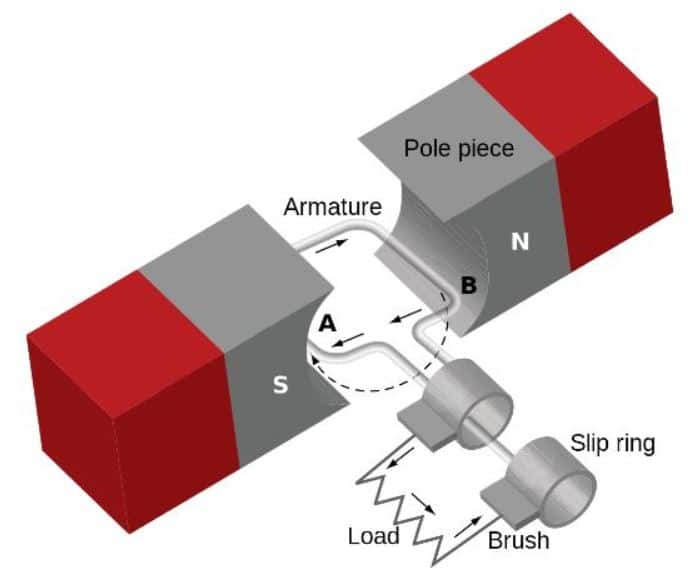
Using an AC generator, the mechanical energy can be transformed into electrical energy. AC Generators are powered by steam turbines, gas turbines, and combustion engines to provide mechanical energy.
Ac generators produce alternating electrical power in the form of alternating current and voltage. The AC generator is sometimes also called an alternator. The most widely used application is air conditioning, which is used by everyone nowadays.
Advantages
- They offer great value for the money.
- Due to its lower maintenance needs, it is perfect for electrical and compact devices in the workplace.
#2 D.C. Generators
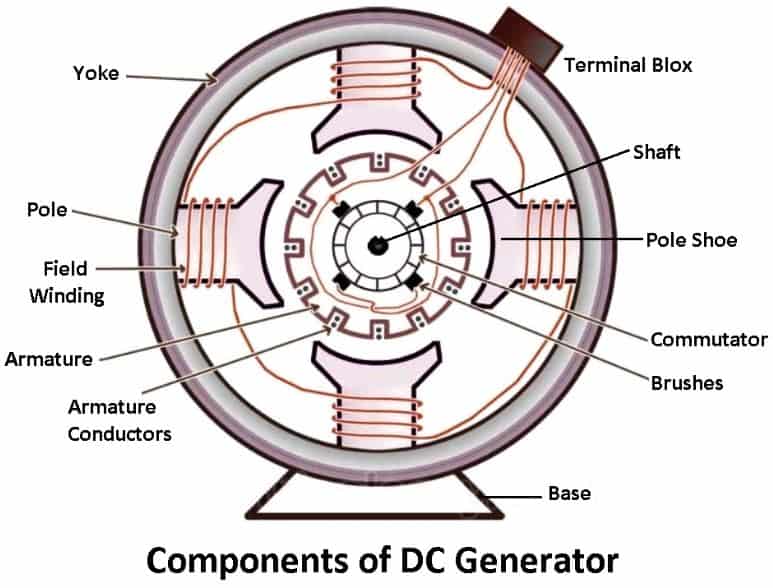
A DC generator is a type of electrical device used primarily to generate electricity from mechanical energy.
It works Based on the electromagnetic induction theory of Faraday’s Laws, an emf will be produced when the conductor cuts the magnetic flux. There are two primary types of DC generators: separately excited and self-excited.
Advantages
- The design of the DC generator is simple.
- The large motors are driven by this generator.
- It generates constant voltage.
#3 Standby Generators
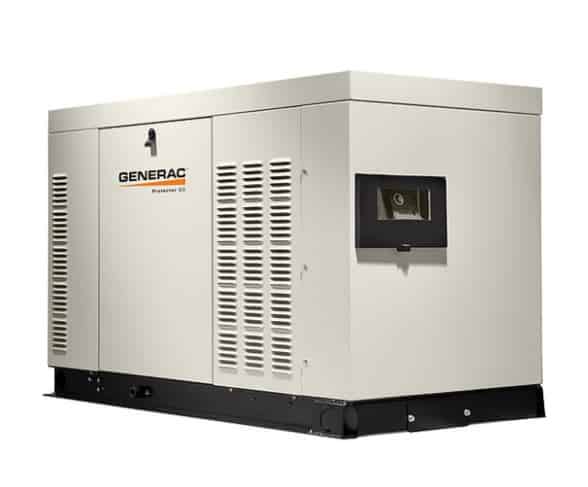
An entire home can be powered by standby generators. Other applications include lights, air conditioning, and some appliances. The majority of standby generators can be connected to your home’s existing natural gas or propane fuel supply.
Some generators come with a backup power source, like solar energy or petrol, to make sure the machine can still run even if your home’s fuel supply is lost. These generators can start themselves automatically in the event of a loss of electricity.
Standby generators are large machines that are larger than an air conditioner because they are designed to produce large amounts of power.
Advantages
- This generator will automatically start if there is an emergency.
- It produces enough power to run the entire house.
- There is no need for extension cords because it is connected to your home’s circuit board.
Disadvantages
- It’s very pricey.
- Typically, it occupies a lot of space.
Read Also: Different Types of Evaporators: Their Working and Applications
#4 Portable Generators
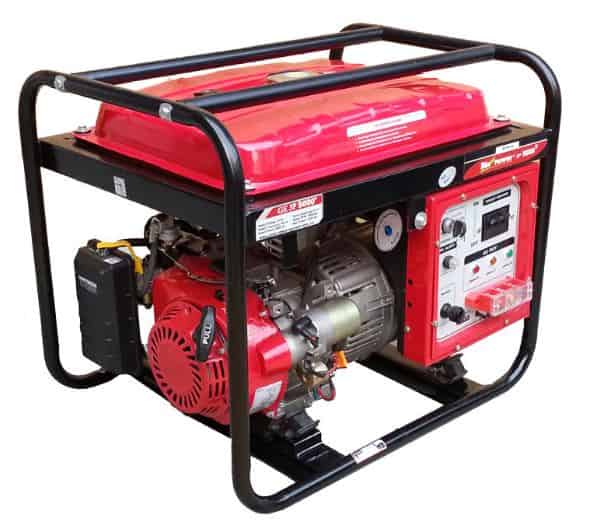
These are small enough to carry on a camping trip or store in your car in case of emergencies. A portable generator has many applications despite being smaller in size.
These generators can run on gasoline, solar energy, or propane, and will be less expensive than standby generators.
A portable generator can be used to power a variety of small tools and appliances for activities like tailgating, camping, and workshop work. Portable generators are ideal for using to power electric tools or charge phones while camping.
Advantages
- Several compact tools and appliances can be powered by these generators.
- They are lightweight, portable, and simple to store.
- Compared to all other types of generators, it is less expensive.
Disadvantages
- It is less powerful than a standby generator.
- This generator won’t be able to run all tools or appliances.
#5 Inverter Generators
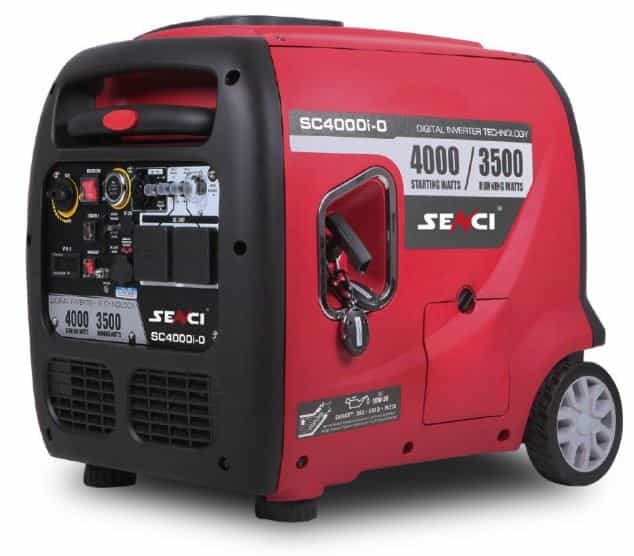
Inverter generators can produce clean energy through a unique process. Clean energy has more consistent output than standard generators. As a result, these are more fuel-efficient, quieter, and safe for charging sensitive electronics.
Compared to other generator types, an inverter generator operates differently. The inverter generator automatically changes the speed of its engine to meet the electrical demands rather than running at a fixed speed. Inverter generators are available in a variety of sizes for consumers to purchase.
Advantages
- These typically are the quietest generators.
- There are fewer emissions from these kinds of generators.
- These generators are lightweight and simple to maintain.
Disadvantages
- The price is higher than that of portable generators.
- This generator has a poor power outlet.
#6 Gasoline Generators
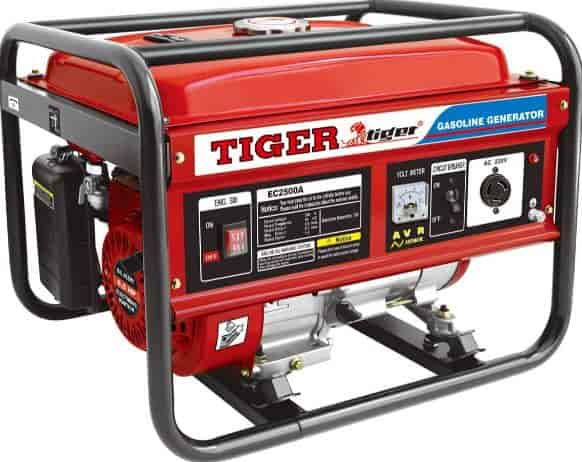
The most common type of generator is a gasoline generator, which is a great choice for tools and appliances with lower power requirements. They are utilized for both residential and industrial use because they are more affordable than other generators.
In terms of cost, gasoline generators are the least expensive, but over time, the cost of gas becomes more expensive. Petrol is easily accessible, but in an emergency, this might not be the case. There is only a three to six-month shelf life for gasoline stored in an airtight container. A fuel stabilizer can extend the gas’s shelf life to three years.
Advantages
- These generators typically have the lowest prices.
- Petrol is widely available, which is a good thing.
- Compared to diesel generators, these are quieter.
Disadvantages
- These emit a lot of smoke and are highly flammable.
- Petrol costs more than other fuels.
Read Also: Different Types of Insulators Used In Transmission Lines
#7 Diesel Generators
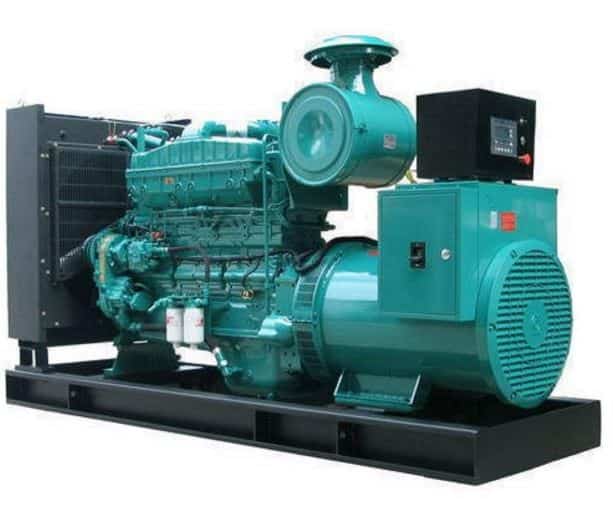
Diesel generators function well in difficult conditions, such as below-freezing temperatures. Since diesel burns at a low temperature and puts less stress on engines, these generators are more durable.
Diesel generators are typically more cost-effective in the long run, despite being initially more expensive than petrol generators. These generators are less portable because they are typically heavier. Additionally, diesel generators emit toxic fumes that can be breathed in.
Advantages
- Compared to a gasoline generator, it is more efficient.
- These are less expensive to run than petrol.
- These types of generators are more durable.
Disadvantages
- These generators are noisier and emit harmful emissions.
- It costs more than gasoline-powered generators.
#8 Solar Generators
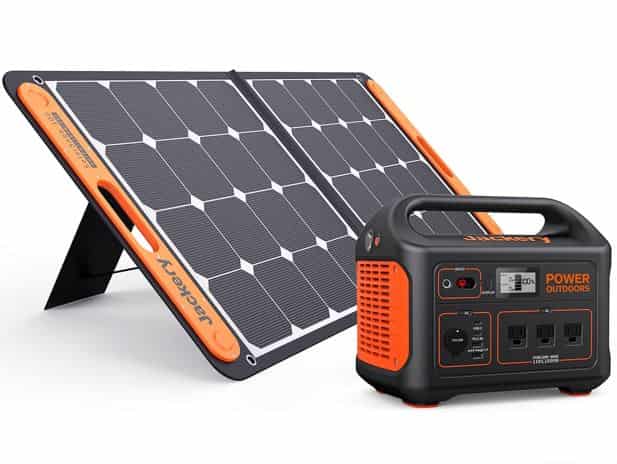
Solar energy is clean and renewable, and powers solar generators. There are no emissions, making it the only generator that can be used safely indoors. Despite being more expensive to buy, these generators frequently require little maintenance.
Compared to other generator types, solar generators produce less power. The solar generator may not be reliable because it depends on the sun for power, making it unreliable in emergencies or at night. Extra solar panels can be added to the system to boost power output if more power is required.
Advantages
- These generators are low maintenance and emit no emissions.
- You can use these generators inside.
Disadvantages
- Due to the need for solar energy, they might not be reliable in an emergency.
- They cost more and produce less power.
#9 Natural Gas Generators
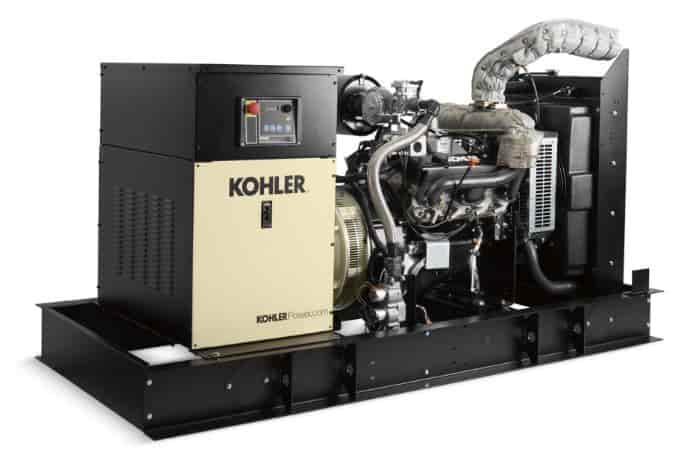
Natural gas generators are initially affordable but may end up costing more in the long run, similar to gasoline generators. These natural gas-powered generators emit fewer emissions than diesel and gasoline-powered ones.
They are connected to gas pipelines, so refilling is never needed. However, attaching the generator to the pipelines will cost more to install and maintain. Still, they can last a very long time with routine maintenance. Generators rely on natural gas, so if the supply is interrupted during an emergency, they will not function.
Advantages
- These generators use cleaner fuel and have low emissions.
- They can be attached to pipelines already in place.
Disadvantages
- They have expensive installation and maintenance costs.
- They cannot be utilized inside.
Read Also: What Are The Types of Circuit Breakers? Working & Application
#10 Biodiesel Generators
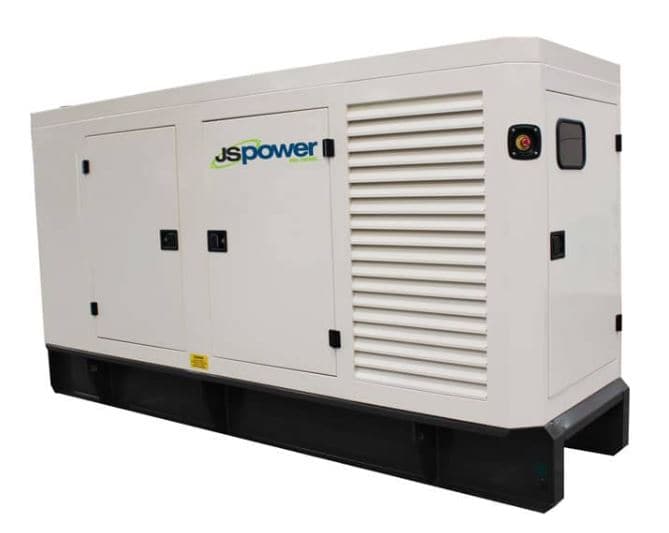
A biodiesel generator might be the best option for those who want the advantages of a diesel generator but want one that is less harmful to the environment. These generators combine diesel fuel with additional ingredients like vegetable or animal fat.
As a result, fewer fossil fuels are used, resulting in lower emissions. Biodiesel generators, like petrol and diesel generators, may be unreliable during power outages where the pumps are broken. These are perfect for those looking for a slightly more environmentally friendly way to get the advantages of a diesel generator.
#11 Propane Generators
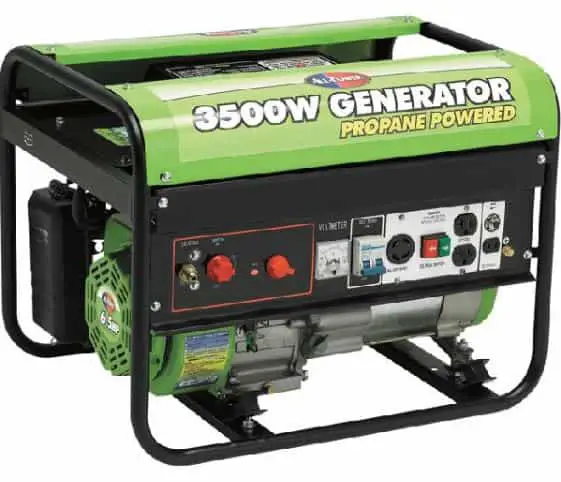
The propane-fueled generators are extremely reliable. Even during a power outage, propane is easily accessible. Propane has the advantages of being simple to store and performing well in cold climates.
This implies that a propane generator can consistently start up and provide power even if the power goes out in the wintertime. The disadvantage is that because propane burns about three times more quickly than diesel generators, it is a more expensive option. Propane should be handled carefully because it is highly flammable.
Advantages
- They last longer than generators powered by diesel and petrol.
- They can burn cleanly and emit few emissions.
- It is easily accessible in the event of an electrical problem.
Disadvantages
- Propane is stored under pressure because it is extremely flammable and even explosive.
#12 Induction Generators
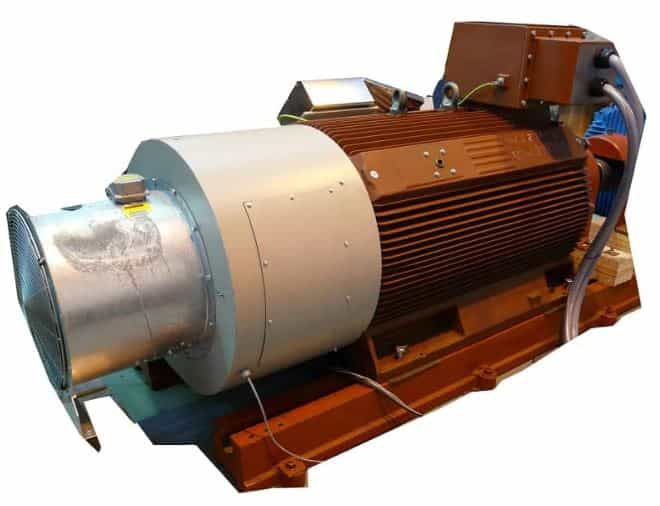
Induction generators work by generating electromagnetic fields that cause an internal rotor to spin at different speeds. These types of generators need a significant amount of mechanical energy to start this process.
Induction generators are therefore often found in wind turbines and small hydroelectric plants. Induction generators have many benefits, including their compact size, ease of maintenance, and capacity to generate power at various speeds. They are a poor choice for home use because of the unstable wattage outputs caused by this speed variance.
Read Also: Different Types of Metals and Their Properties
#13 Emulsified Diesel Generators
The emulsified diesel generator runs on diesel mixed with water, making it even more environmentally friendly than biodiesel generators. The benefits and drawbacks of these generators are comparable to those of diesel and biodiesel generators.
They have lower emissions and are a long-term cost-effective choice. If there is a power outage, however, emulsified diesel may not be available.
Advantages
- These generators use less fossil fuel than regular diesel and emit fewer pollutants.
Disadvantages
- It also has a two-year shelf life, and maintaining the proper water-to-diesel ratio can be challenging, especially under hectic work circumstances.
#14 Hydrogen Generators
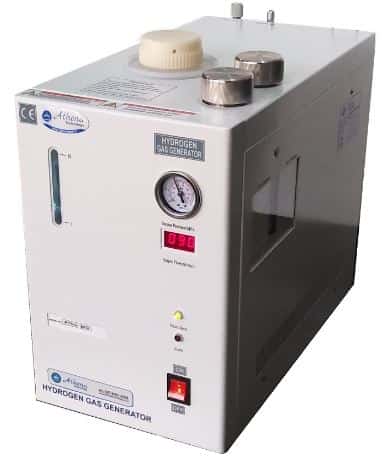
A hydrogen generator uses an electrolysis process to turn water into hydrogen gas. The subsequent burning of this hydrogen gas generates electricity. In comparison to other fuels, hydrogen generators are strong, environmentally friendly, and produce more energy per pound.
Hydrogen generators can reduce your electricity, despite being hard to find and initially expensive. These are great choices for a variety of settings, including homes, businesses, laboratories, industrial plants, and farms thanks to their dependability and efficiency. Even automobiles can use mobile hydrogen generators.
#15 Industrial Generators
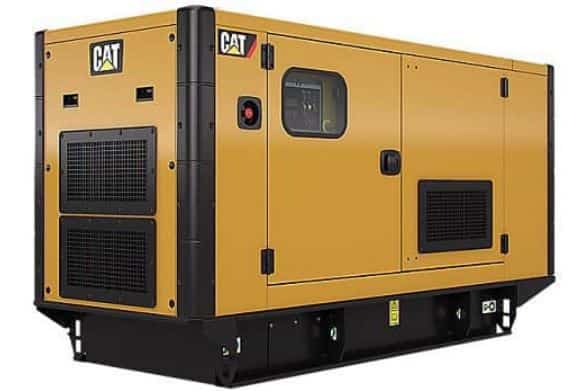
Industrial generators operate similarly to standard generators, but they are noticeably larger and less durable. Due to their large size, these generators are frequently moved by crane or forklift.
Depending on the model, these generators can produce up to two megawatts of power and can withstand weather conditions, transportation, and other strains. These are big machines that cost a lot of money even though they are safe and powerful.
Read Also: Understand The Different Types of Furnaces [PDF]
Applications of Generators
These are some of the uses for a generator, which are described below:
- In locations like homes, businesses, and workplaces where power outages are common, generators are useful.
- These machines will ensure that the appliances will not stop operating without electricity in case of an outage.
- In remote areas where mainline electricity is unavailable, electric generators are the main source of power.
- On construction sites where grid electricity is not available, electric generators can be used to power equipment or tools.
Conclusion
That’s it. Thanks for reading. I hope I have covered everything about the “Types of Generators.” It would be helpful if you could let me know if there was anything I missed or if you have any doubts about anything I wrote.
Please share this article with your friends if you find it interesting.
Want free PDFs direct to your inbox? Then subscribe to our newsletter.
Download PDF of this article:
You might like to read more in our blog:
- Everything You Need To Know About Heat Exchangers
- Understand The Different Types of Transformers
- What is Coupling? 13 Different Types of Coupling
References and External Links:
- https://en.wikipedia.org/wiki/Electric_generator
- https://www.forbes.com/home-improvement/electrical-generators/
FAQs
Electric generators convert mechanical energy into electrical energy. It uses mechanical energy to transfer electric charges in the wire of its windings across an external electric circuit.
There are two fundamental types of generators:
1. Direct current (DC) generators: It converts mechanical energy into DC power.
2. Alternating current (AC) generators: It converts mechanical energy into AC power.
A generator is composed of six basic parts: the fuel system, the engine, the alternator, the cooling, the lubricating, and the exhaust systems.
A standby generator for the home is an automatic, permanent source of backup power that is powered by natural gas or liquid propane. Portable generators are immediate but temporary solutions.
Hey Yousef!
Your post on generator types and applications is an exceptional blend of insightful content and clarity. Your expertise shines through, making complex engineering topics accessible to all. A valuable contribution to the field!
Thank you for your kind words! 🙏😊